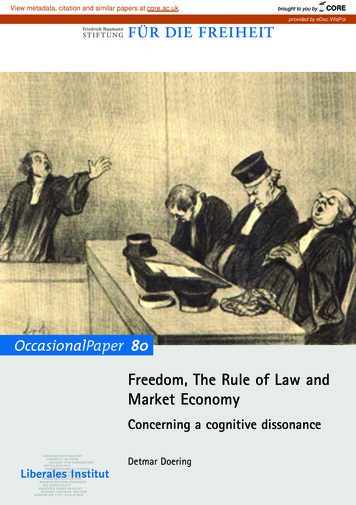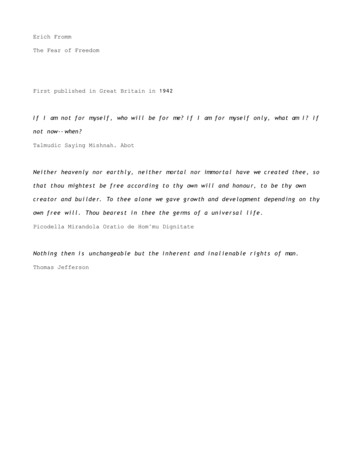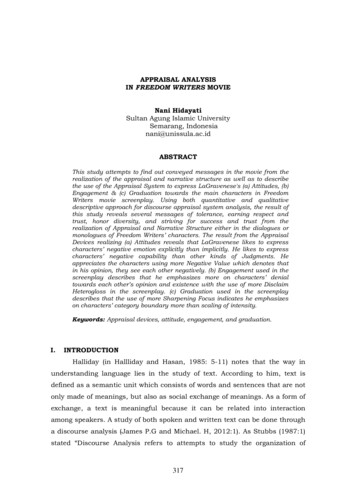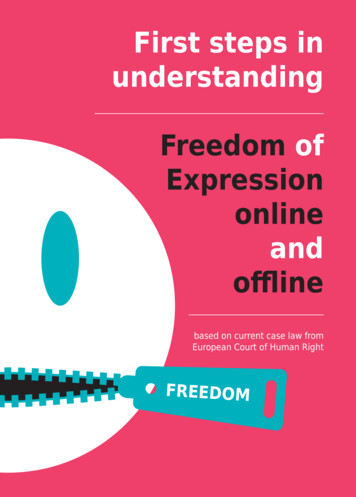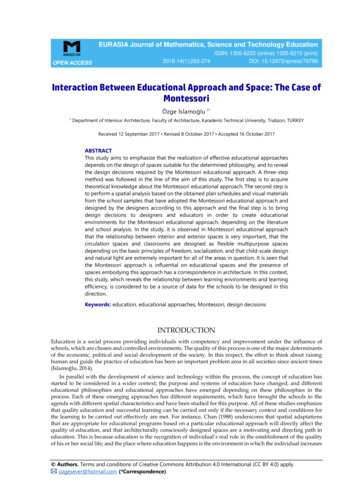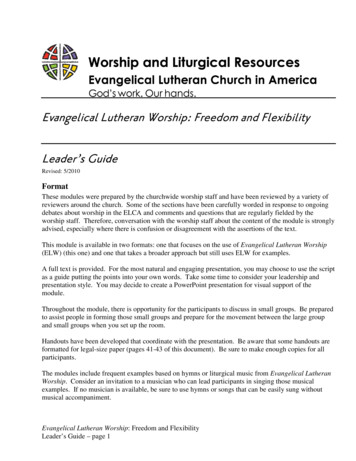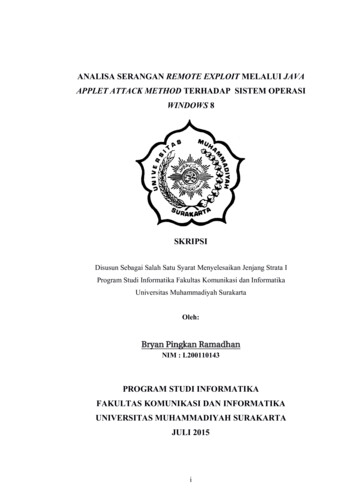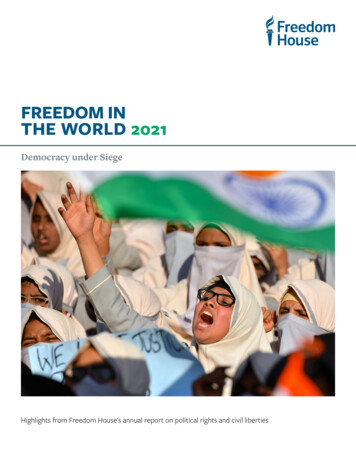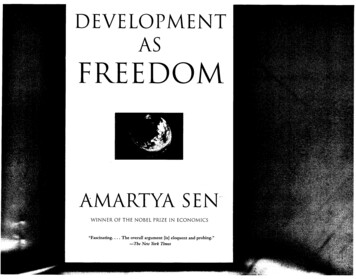
Transcription
DEVELOPMENTFREEDOMAMARTYA SEN-.,WINNER OF THE NOBEL PRIZE IN ECONOMICS"Fascinating. . . The overall argument [is] eloquent and probing."-The New York Times
FIRST ANCHOR BOOKS EDITION, AUGUST 2000Copyright Q 1999 by Amartya SenAll rights reserved under International and Pan-American CopyrightConventions. Published in the United States by Anchor Books, a division ofRandom House, Inc., New York, and simultaneously in Canada by RandomHouse of Canada Limited, Toronto. Originally published in hardcover in theUnited States by Alfred A. Knopf, a division of Random House, Inc.,New York, in 1999.Anchor Books and colophon are registered trademarksof Random House, Inc.Grateful acknowledgment is made to The New York Timesfor permission to reprint an excerpt from "Birth Control in China" byP. Tyler (The New York Times, June 25, 1995), copyright O 1995by the New York Times Co. Reprinted by permission.Grateful acknowledgment is made to reprint previously publishedmaterial: Bank of Italy: Excerpt from "Inflation, Growth and MonetaryControl: Non-linear Lessons from Crisis and Recovery" by Michael Bruno,Paolo Baffi Lecture (Rome: 1996).The Library of Congress has cataloged the Knopf edition as follows:Sen, Amartya Kumar.Development as freedom / Amartya Sen. - 1st ed.p. cm.Includes bibliographical references and index.I. Economic development. 2. Liberty. I. Title.HD75.S455 1999330'.016 2199-31061CIPAnchor ISBN: 0-385-72027-0Author photograph by Kris SnibbeGraphs by Mark SteinPrinted in the United States of America20 19 18 17 16 15 14 13 12To Emma
INTRODUCTIONDEVELOPMENT A S FREEDOMvDevelopment can be seen, it is argued here, as a process of expandingthe real freedoms that people enjoy. Focusing on human freedomscontrasts with narrower views of development, such as identifyingdevelopment with the growth of gross national product, or with therise in personal incomes, or with industrialization, or with technological advance, or with social modernization. Growth of GNP or ofindividual incomes can, of course, be very important as means toexpanding the freedoms enjoyed by the members of the society. Butfreedoms depend also on other determinants, such as social and economic arrangements (for example, facilities for education and healthcare) as well as political and civil rights (for example, the libertyto participate in public discussion and scrutiny). Similarly, industrialization or technological progress or social modernization cansubstantially contribute to expanding human freedom, but freedomdepends on other influences as well. If freedom is what development advances, then there is a major argument for concentrating onthat overarching objective, rather than on some particular means, orsome specially chosen list of instruments. Viewing development interms of expanding substantive freedoms directs attention to the endsthat make development important, rather than merely to some of themeans that, inter alia, play a prominent part in the process.Development requires the removal of major sources of unfreedom: poverty as well as tyranny, poor economic opportunities as wellas systematic social deprivation, neglect of public facilities as well asintolerance or overactivity of repressive states. Despite unprecedented increases in overall opulence, the contemporary world denies
4D E V E L O P M E N TASF R E E D O Melementary freedoms to vast numbers-perhaps even the majorityof people. Sometimes the lack of substantive freedoms relates directlyto economic poverty, which robs people of the freedom to satisfyhunger, or to achieve sufficient nutrition, or to obtain remedies fortreatable illnesses, or the opportunity to be adequately clothed orsheltered, or to enjoy clean water or sanitary facilities. In other cases,the unfreedom links closely to the lack of public facilities and socialcare, such as the absence of epidemiological programs, or of organized arrangements for health care or educational facilities, or ofeffective institutions for the maintenance of local peace and order.In still other cases, the violation of freedom results directly from adenial of political and civil liberties by authoritarian regimes andfrom imposed restrictions on the freedom to participate in the social,political and economic life of the community.E F F E C T I V E N E S S A N D INTERCONNECTIONSFreedom is central to the process of development for two distinctreasons.I) The evaluative reason: assessment of progress has to be doneprimarily in terms of whether the freedoms that people have areenhanced;2) The effectiveness reason: achievement of development isthoroughly dependent on the free agency of people.I have already signaled the first motivation: the evaluative reasonfor concentrating on freedom. In pursuing the second, that of effectiveness, we have to look at the relevant empirical connections, inparticular at the mutually reinforcing connections between freedomsof different kinds. It is because of these interconnections, which areexplored in some detail in this bobk, that free and sustainable agencyemerges as a major engine of development. Not only is free agencyitself a "constitutive" part of development, it also contributes to thestrengthening of free agencies of other kinds. The empirical connections that are extensively explored in this study link the two aspectsof the idea of "development as freedom."The relation between individual freedom and the achievement ofsocial development goes well beyond the constitutive connection-Introduction5important as it is. What people can positively achieve is influenced byeconomic opportunities, political liberties, social powers, and theenabling conditions of good health, basic education, and the encouragement and cultivation of initiatives. The institutional arrangementsfor these opportunities are also influenced by the exercise of people'sfreedoms, through the liberty to participate in social choice and inthe making of public decisions that impel the progress of theseopportunities. These interconnections are also investigated here.S O M E ILLUSTRATIONS: POLITICALFREEDOM A N D QUALITY O F LIFEThe difference that is made by seeing freedom as the principal ends ofdevelopment can be illustrated with a few simple examples. Eventhough the full reach of this perspective can only emerge from amuch more extensive analysis (attempted in the chapters to follow),the radical nature of the idea of "development as freedom" can easilybe illustrated with some elementary examples.First, in the context of the narrower views of development interms of GNP growth or industrialization, it is, often asked whethercertain political or social freedoms, such as the liberty of politicalparticipation and dissent, or opportunities to receive basic education,are or are not "conducive to development." In the light of the morefoundational view of development as freedom, this way of posing thequestion tends to miss the important understanding that these substantive freedoms (that is, the liberty of political participation or theopportunity to receive basic education or health care) are among theconstituent components of development. Their relevance for development does not have to be freshly established through their indirectcontribution to the growth of GNP or to the promotion of industrialization. As it happens, these freedoms and rights are also very effective in contributing to economic progress; this connection will receiveextensive attention in this book. But while the causal relation isindeed significant, the vindication of freedoms and rights provided bythis causal linkage is over and above the directly constitutive role ofthese freedoms in development.A second illustration relates to the dissonance between incomeper head (even after correction for price variat ons)and the freedomof individuals to live long and live well. For example, the citizens of
6DEVELOPMENTASFREEDOMGabon or South Africa or Namibia or Brazil may be much richer interms of per capita GNP than the citizens of Sri Lanka or China orthe state of Kerala in India, but the latter have very substantiallyhigher life expectancies than do the former.To take a different type of example, the point is often made thatAfrican Americans in the United States are relatively poor comparedwith American whites, though much richer than people in the thirdworld. It is, however, important to recognize that African Americanshave an absolutely lower chance of reaching mature ages than dopeople of many third world societies, such as China, or Sri Lanka, orparts of India (with different arrangements of health care, education,and community relations). If development analysis is relevant evenfor richer countries (it is argued in this work that this is indeed so),the presence of such intergroup contrasts within the richer countriescan be seen to be an important aspect of the understanding of development and underdevelopment.TRANSACTIONS, MARKETS AND ECONOMIC UNFREEDOMA third illustration relates to the role of markets as part of theprocess of development. The ability of the market mechanism to contribute to high economic growth and to overall economic progresshas been widely-and rightly-acknowledged in the contemporarydevelopment literature. But it would be a mistake to understand theplace of the market mechanism only in derivative terms. As AdamSmith noted, freedom of exchange and transaction is itself pan andparcel of the basic liberties that people have reason to value.To be generically against markets would be almost as odd as beinggenerically against conversations between people (even though someconversations are clearly foul and cause problems for others-oreven for the conversationalists themselves).The freedom to exchangewords, or goods, or gifts does not need defensive justification interms of their favorable but distant effects; they are part of the wayhuman beings in society Live and interact with each other (unlessstopped by regulation or fiat). The contribution of the market mechanism to economic growth is, of course, important, but this comesonly after the direct significance of the freedom to interchangewords, goods, gifts-has been acknowledged.Introduction7As it happens, the rejection of the freedom to participate in thelabor market is one of the ways of keeping people in bondage andcaptivity, and the battle against the unfreedom of bound labor isimportant in many third world countries today for some of the samereasons the American Civil War was momentous. The freedom toenter markets can itself be a significant contribution to development,quite aside from whatever the market mechanism may or maynot do to promote economic growth or industrialization. In fact, thepraise of capitalism by Karl Marx (not a great admirer of capitalismin general) and his characterization (in Das Kapital) of the American Civil War as "the one great event of contemporary history"related directly to the importance of the freedom of labor contractas opposed to slavery and the enforced exclusion from the labor market. As will be discussed, the crucial challenges of development inmany developing countries today include the need for the freeing oflabor from explicit or implicit bondage that denies access to the openlabor market. Similarly, the denial of access to product marketsis often among the deprivations from which many small cultivatorsand struggling producers suffer under traditional arrangements andrestrictions. The freedom to participate in economic interchange hasa basic role in social living.To point to this often neglected consideration is not to deny theimportance of judging the market mechanism comprehensively interms of all its roles and effects, including those in generating economic growth and, under many circumstances, even economic equity.We must also examine, on the other side, the persistence of deprivations among segments of the community that happen to remainexcluded from the benefits of the market-oriented society, and thegeneral judgments, including criticisms, that people may have of lifestyles and values associated with the culture of markets. In seeingdevelopment as freedom, the arguments on different sides have to beappropriately considered and assessed. It is hard to think that anyprocess of substantial development can do without very extensiveuse of markets, but that does not preclude the role of social support,public regulation, or statecraft when they can enrich-rather thanimpoverish-human lives. The approach used here provides a broaderand more inclusive perspective on markets than is frequently invokedin either defending or chastising the market mechanism.
8D E V E L O P M E N TASF R E E D O MI end this list of illustrations with another that draws directly ona personal recollection from my own childhood. I was playing onea f t e r n o o n 1 must have been around ten or so-in the garden in ourfamily home in the city of Dhaka, now the capital of Bangladesh,when a man came through the gate screaming pitifully and bleedingprofusely; he had been knifed in the back. Those were the days ofcommunal riots (with Hindus and Muslims killing each other), whichpreceded the independence and partitioning of India and Pakistan.The knifed man, called Kader Mia, was a Muslim daily laborer whohad come for work in a neighboring house-for a tiny reward-andhad been knifed on the street by some communal thugs in our largelyHindu area. As I gave him water while also crying for help fromadults in the house, and moments later, as he was rushed to the hospital by my father, Kader Mia went on telling us that his wife hadtold him not to go into a hostile area in such troubled times. ButKader Mia had to go out in search of work and a bit of earningbecause his family had nothing to eat. The penalty of his economicunfreedom turned out to be death, which occurred later on in thehospital.The experience was devastating for me. It made me reflect, lateron, on the terrible burden of narrowly defined identities, includingthose firmly based on communities and groups (I shall have occasionto discuss that issue in this book). But more immediately, it alsopointed to the remarkable fact that economic unfreedom, in the formof extreme poverty, can make a person a helpless prey in the violationof other kinds of freedom. Kader Mia need not have come to a hostile area in search of a little income in those terrible times had hisfamily been able to survive without it. Economic unfreedom canbreed social unfreedom, just as social or political unfreedom can alsofoster economic unfreedom.IORGANIZATIONS AND VALUESMany other examples can be given to illustrate the pivotal differencethat is made by pursuing a view of development as an integratedprocess of expansion of substantive freedoms that connect with oneanother. It is this view that is presented, scrutinized and utilizedin this book to investigate the development process in inclusiveterms that integrate economic, social and political considerations.Introduction9A broad approach of this kind permits simultaneous appreciationof the vital roles, in the process of development, of many differentinstitutions, including markets and market-related organizations,governments and local authorities, political parties and other civicinstitutions, educational arrangements and opportunities of opendialogue and debate (including the role of the media and other meansof communication).Such an approach also allows us to acknowledge the role of socialvalues and prevailing mores, which can influence the freedoms thatpeople enjoy and have reason to treasure. Shared norms can influencesocial features such as gender equity, the nature of child care, familysize and fertility patterns, the treatment of the environment andmany other arrangements and outcomes. Prevailing values and socialmores also affect the presence or absence of corruption, and the roleof trust in economic or social or political relationships. The exercise of freedom is mediated by values, but the values in turn areinfluenced by public discussions and social interactions, which arethemselves influenced by participatory freedoms. Each of these connections deserves careful scrutiny.The fact that the freedom of economic transactions tends to betypically a great engine of economic growth has been widelyacknowledged, even though forceful detractors remain. It is important not only to give the markets their due, but also to appreciate therole of other economic, social, and political freedoms in enhancingand enriching the lives that people are able to lead. This has a clearbearing even on such controversial matters as the so-called population problem. The role of freedom in moderating excessively high fertility rates is a subject on which contrary views have been held for along time. While that great eighteenth-century French rationalistCondorcet expected that fertility rates would come down with "theprogress of reason," so that greater security, more education andmore freedom of reflected decisions would restrain populationgrowth, his contemporary Thomas Robert Malthus differed radicallywith this position. Indeed, Malthus argued that "there is no reasonwhatever to suppose that anything beside the difficulty of procuringin adequate plenty the necessaries of life should either indispose thisgreater number of persons to marry early, or disable them from rearing in health the largest families." The comparative merits of the twodifferent positions-relying respectively on reasoned freedom and
I 0DEVELOPMENTASF R E E D O Meconomic compulsion-will be investigated later on in this study (thebalance of evidence, I shall argue, is certainly more on Condorcet'sside). But it is especially important to recognize that this particularcontroversy is just one example of the debate between profreedomand antifreedom approaches to development that has gone on formany centuries. That debate is still very active in many differentforms.INSTITUTIONS AND INSTRUMENTAL FREEDOMSFive distinct types of freedom, seen in an "instrumental" perspective,are particularly investigated in the empirical studies that follow.These include (I)political freedoms, ( 2 )economic facilities, ( 3 ) socialopportunities, ( 4 ) transparency guarantees and ( 5 ) protective security. Each of these distinct types of rights and opportunities helps toadvance the general capability of a person. They may also serve tocomplement each other. Public policy to foster human capabilitiesand substantive freedoms in general can work through the promotion of these distinct but interrelated instrumental freedoms. In thechapters that follow, each of these different types of freedom-andthe institutions involved-will be explored, and their interconnections discussed. There will be an opportunity also to investigate theirrespective roles in the promotion of overall freedoms of people tolead the kind of lives they have reason to value. In the view of "development as freedom," the instrumental freedoms link with each otherand with the ends of enhancement of human freedom in general.While development analysis must, on the one hand, be concernedwith objectives and aims that make these instrumental freedoms consequentially important, it must also take note of the empirical linkages that tie the distinct types of freedom together, strengtheningtheir joint importance. Indeed, these connections are central to afuller understanding of the instrumental role of freedom.A CONCLUDING REMARKFreedoms are not only the primary ends of development, they arealso among its principal means. In addition to acknowledging, foundationally, the evaluative importance of freedom, we also have toIntroductionIIunderstand the remarkable empirical connection that links freedomsof different kinds with one another. Political freedoms (in the form offree speech and elections) help to promote economic security. Socialopportunities (in the form of education and health farilitiprr fwilit**eeconomic participation. Economic facilities (in the form of opportunities for participation in trade and production) can help to generatepersonal abundance as well as public resources for social facilities.Freedoms of different kinds can strenmhen one another.These empirical connections reinforce the valuational priorities.In terms of the medieval distinction between "the patient" and "theagent," this freedom-centered understanding of economics and of theprocess of development is very much an agent-oriented view. Withadequate social opportunities, individuals can effectively shape theirown destiny and help each other. They need not be seen vrimarilv as-.--------pfree and sustainable agency-and--a-y-"'.".,I".*"Ieven of constructive irnnatienr
CHAPTERITHE P E R S P E C T I V E O F FREEDOMIt is not unusual for couples to discuss the possibility of earning moremoney, but a conversation on this subject from around the eighthcentury B.C. is of some special interest. As that conversation isrecounted in the Sanskrit text Brihadaranyaka Upanishad, a womannamed Maitreyee and her husband, Yajnavalkya, proceed rapidlyto a bigger issue than the ways and means of becoming more wealthy:How far would wealth go to help them get what they want31Maitreyee wonders whether it could be the case that if "the wholeearth, full of wealth" were to belong just to her, she could achieveimmortality through it. "No," responds Yajnavalkya, "like the life ofrich people will be your life. But there is no hope of immortality bywealth." Maitreyee remarks, "What should I do with that by whichI do not become immortal?"Maitreyee's rhetorical question has been cited again and againin Indian religious philosophy to illustrate both the nature of thehuman predicament and the limitations of the material world. Ihave too much skepticism of otherworldly matters to be led there byMaitreyee's worldly frustration, but there is another aspect of thisexchange that is of rather immediate interest to economics and tounderstanding the nature of development. This concerns the relation between incomes and achievements, between commodities andcapabilities, between our economic wealth and our ability to live aswe would like. While there is a connection between opulence andachievements, the linkage may or may not be very strong and maywell be extremely contingent on other circumstances. The issue isnot the ability to live forever on which Maitreyee-bless her soul-
I4DEVELOPMENTASFREEDOMhappened to concentrate, but the capability to live really long (without being cut off in one's prime) and to have a good life while alive(rather than a life of misery and unfreedom)-things that would bestrongly valued and desired by nearly all of us. The gap between thetwo perspectives (that is, between an exclusive concentration on economic wealth and a broader focus on the lives we can lead) is a majorissue in conceptualizing development. As Aristotle noted at the verybeginning of the Nicomachean Ethics (resonating well with the conversation between Maitreyee and Yajnavalkya three thousand milesaway), "wealth is evidently not the good we are seeking; for it ismerely useful and for the sake of something else." If we have reasons to want more wealth, we have to ask: Whatprecisely are these reasons, how do they work, on what are they contingent and what are the things we can "do" with more wealth? Infact, we generally have excellent reasons for wanting more income orwealth. This is not because income and wealth are desirable for theirown sake, but because, typically, they are admirable general-purposemeans for having more freedom to lead the kind of lives we have reason to value.The usefulness of wealth lies in the things that it allows us to dothe substantive freedoms it helps us to achieve. But this relation isneither exclusive (since there are significant influences on our livesother than wealth) nor uniform (since the impact of wealth on ourlives varies with other influences). It is as important to recognize thecrucial role of wealth in determining living conditions and the qualityof life as it is to understand the qualified and contingent nature of thisrelationship. An adequate conception of development must go muchbeyond the accumulation of wealth and the growth of gross nationalproduct and other income-related variables. Without ignoring theimportance of economic growth, we must look well beyond it.The ends and means of development require examination andscrutiny for a fuller understanding of the development process; it issimply not adequate to take as our basic objective just the maximization of income or wealth, which is, as Aristotle noted, "merely usefuland for the sake of something else." For the same reason, economicgrowth cannot sensibly be treated as an end in itself. Developmenthas to be more concerned with enhancing the lives we lead and thefreedoms we enjoy. Expanding the freedoms that we have reason toThe Perspective of FreedomISvalue not only makes our lives richer and more unfettered, but alsoallows us to be fuller social persons, exercising our own volitionsand interacting with-and influencing-the world in which we live.In chapter 3 this genera! approach is more fully proposed and scrutinized, and is evaluatively compared with other approaches thatcompete for attention.3F O R M S O F UNFREEDOMVery many people across the world suffer from varieties of unfreedom. Famines continue to occur in particular regions, denying to millions the basic freedom to survive. Even in those countries which areno longer -sporadically devastated by famines, undernutrition mayaffect very large numbers of vulnerable human beings. Also, a greatmany people have little access to health care, to sanitary arrangements or to clean water, and spend their lives fighting unnecessarymorbidity, often succumbing to premature mortality. The richer countries too often have deeply disadvantaged people, who lack basicopportunities of health care, or functional education, or gainfulemployment, or economic and social security. Even within very richcountries, sometimes the longevity of substantial groups is no higherthan that in much poorer economies of the so-called third world.Furthel; inequality between women and men afflicts-and sometimeprematurely ends-the lives of millions of women, and, in differentways, severely restricts the substantive freedoms that women enjoy.Moving to other deprivations of freedom, a great many people indifferent countries of the world are systematically denied politicalliberty and basic civil rights. It is sometimes claimed that the denialof these rights helps to stimulate economic growth and is "good" forrapid economic development. Some have even championed harsherpolitical systems-with denial of basic civil and political rights-fortheir alleged advantage in promoting economic development. Thisthesis (often called "the Lee thesis," attributed in some form to theformer prime minister of Singapore, Lee Kuan Yew) is sometimesbacked by some fairly rudimentary empirical evidence. In fact, morecomprehensive intercountry comparisons have not provided any confirmation of this thesis, and there is little evidence that authoritarian politics actually helps economic growth. Indeed, the empirical
16DEVELOPMENTASF R E E D O Mevidence very strongly suggests that economic growth is more a matter of a friendlier economic climate than of a harsher political system.This issue will receive examination in chapter 6 .Furthermore, economic development has other dimensions, including economic security. Quite often economic insecurity can relate tothe lack of democratic rights and liberties. Indeed, the working ofdemocracy and of political rights can even help to prevent faminesand other economic disasters. Authoritarian rulers, who are themselves rarely affected by famines (or other such economic calamities),tend to lack the incentive to take timely preventive measures. Democratic governments, in contrast, have to win elections and face publiccriticism, and have strong incentives to undertake measures to avertfamines and other such catastrophes. It is not surprising that nofamine has ever taken place in the history of the world in a functioning democracy-be it economically rich (as in contemporary WesternEurope or North America) or relatively poor (as in postindependenceIndia, or Botswana, or Zimbabwe). Famines have tended to occur incolonial territories governed by rulers from elsewhere (as in BritishIndia or in an Ireland administered by alienated English rulers), or inone-party states (as in the Ukraine in the 1930s or China during1958-1961, or Cambodia in the 1970s) or in military dictatorships(as in Ethiopia, or Somalia, or some of the Sahel countries in the nearpast). Indeed, as this book goes to press, the two countries that seemto be leading the "famine league" in the world are North Korea andSudan-both eminent examples of dictatorial rule. While the prevention of famine illustrates the incentive advantages with great clarityand force, the advantages of democratic pluralism do, in fact, have amuch wider reach.But-most fundamentally-poiitical liberty and civil freedomsare directly important on their own, and do not have to be justifiedindirectly in terms of their effects on the economy. Even when peoplewithout political liberty or civil rights do not lack adequate economicsecurity (and happen to enjoy favorable economic circumstances),they are deprived of important freedoms in leading their lives anddenied the opportunity to take part in crucial decisions regardingpublic affairs. These deprivations restrict social and political lives,and must be seen as repressive even without their leading to otherafflictions (such as economic disasters). Since political and civil free-The Perspective of Freedom17doms are constitutive elements of human freedom, their denial is ahandicap in itself. In examining the role of human rights in development, we have to take note of the constitutive as well as the instrumental importance
thoroughly dependent on the free agency of people. I have already signaled the first motivation: the evaluative reason for concentrating on freedom. In pursuing the second, that of effec- tiveness, we have to look at the relevant empirical connections, in particular at the mutually reinforcing connections between freedoms of different kinds.
